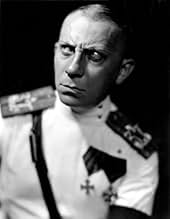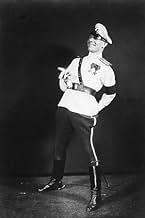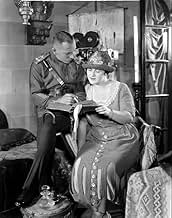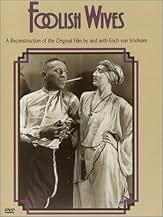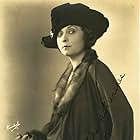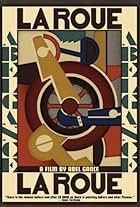IMDb RATING
7.0/10
4.1K
YOUR RATING
A con artist masquerades as Russian nobility and attempts to seduce the wife of an American diplomat.A con artist masquerades as Russian nobility and attempts to seduce the wife of an American diplomat.A con artist masquerades as Russian nobility and attempts to seduce the wife of an American diplomat.
- Awards
- 1 win
Miss DuPont
- Helen Hughes
- (as Miss Dupont)
Erich von Stroheim
- Count Sergius Karamzin - Capt. 3rd Hussars Imper. Russian Army
- (as Erich Von Stroheim)
Albert Edmondson
- Pavel Pavlich
- (as Al Edmondson)
Malvina Polo
- Marietta Ventucci
- (as Malvine Polo)
Nigel De Brulier
- Monk
- (uncredited)
Robert Edeson
- Andrew J. Hughes
- (uncredited)
Agnes Emerson
- Bit Role
- (uncredited)
Louise Emmons
- Mother Garoupe
- (uncredited)
Harrison Ford
- Rude Soldier
- (uncredited)
- …
Valerie Germonprez
- Extra
- (uncredited)
Mrs. Kent
- Dr. Judd's Wife
- (uncredited)
Mme. Kopetzky
- Actress
- (uncredited)
Storyline
Did you know
- TriviaErich von Stroheim's attention to detail was such that he ordered an engraver to print copies of French money as props for the movie (he was playing the role of a counterfeiter). Unfortunately, the money printed was realistic enough that, shortly before shooting began, von Stroheim was arrested and hauled into court on counterfeiting charges. He escaped punishment by arguing to the judge that "the money was for use in pictures only."
- GoofsWhen the original actor playing Mr. Hughes died in the middle of filming, he was replaced by a double, who completed his scenes with his back mostly to the camera. Apparently, however, nobody noticed that the original actor had significantly darker hair than his replacement. Therefore, Mr. Hughes's hair turns white in several scenes, including the sequence where his wife says goodbye to him in the casino, and his confrontation with the count at the villa.
- Quotes
Count Sergius Karamzin - Capt. 3rd Hussars Imper. Russian Army: Yes-husbands are stupid; with them a woman won is a woman secure...
- Alternate versionsThe Kino Video edition released in 2003 is 143 minutes.
- ConnectionsEdited into The Moving Picture Boys in the Great War (1975)
Featured review
Today Erich Von Stroheim is best recalled by the general public for his appearances in such films as the 1950 SUNSET BLVD--but fans of silent film know him as one of early cinema's great directors, creator of such films as BLIND HUSBANDS, FOOLISH WIVES, and the legendary masterwork GREED. The film is available in several VHS and DVD releases; perhaps the best, however, is offered by Kino Video, which also includes a profile of Von Stroheim as well.
FOOLISH WIVES is generally believed to be the first film made that cost one million dollars. In the modern era, when film budgets often run into many millions of dollars, this may seem slight--but in 1922 Universal Studios was staggered not only by the costs, but by Von Stroheim's seemingly endless shooting schedule; at a time when most movies were made in six weeks or less, FOOLISH WIVES took a year or more to complete and threatened to bankrupt the studio.
The circumstances brought Von Stroheim into direct conflict with production manager Irving Thalberg, who threatened to replace him with another director. By most accounts, Von Stroheim laughed in Thalberg's face: not only was he director, he was the star as well, and if he were fired the film would never be completed. Thalberg and Universal had little choice but grin and bear it... but it was something Thalberg would recall several years later, much to Von Stroheim's chagrin.
Set in post-World War I Monaco, FOOLISH WIVES presents the story of the ultra-amoral Count Wladislaw Sergius (Von Stroheim) and his two supposed cousins Olga (Maude George) and Vera (Mae Busch) who present themselves as wealthy Russian nobility--but who are in fact a trio of vicious con-artists who generate cash flow by passing counterfeit bills through Monaco's legendary casinos. Eager to deflect suspicion, they scrape acquaintance with an American diplomat and his wife (Rudolph Christians and Helen Hughes)--and in time at all the naive wife is so much putty in the Count's diabolical hands.
Von Stroheim recreated a fairly large chunk of Monaco on the Universal back lot, and the sets, costumes, and crowds of extras still put most modern productions to shame. But the film's real fascination are the deadly trio of Maude George, Mae Busch, and most particularly Von Stroheim himself. Within the first few minutes of the film he contemplates advances upon an attractive but mentally deficient young woman--and as the plot unfolds we discover that he has seduced the maid with a promise of marriage he does not intend to keep. This, of course, does not prevent him from taking her life savings for a little gambling money when the need arises! The overall cast is quite good, with Miss DuPont a stand out as the diplomat's wife, and the cast plays without recourse to the broad mannerisms often seen in many silent films. But what drives the film is our curiosity at how far Von Stroheim will take both the film and his own performance. The answer? Plenty far indeed. It's all fascinating stuff, and truly this is the film that gave Von Stroheim the title of "The Man You Love To Hate." FOOLISH WIVES was soundly condemned by the moral authorities of the day, and Universal lost a bundle on the project. In an effort to recoup some of the loss, the studio cut and then recut the film to a more reasonable length for distribution; as a result, great chunks of the film were lost. While a "complete" version is an impossibility, the Kino version seems to restore the film as completely as possible.
FOOLISH WIVES inevitably pales in comparison to Stroheim's later GREED, but it is a remarkably fine, remarkably watchable silent--and the two films would have a circular effect. For when Von Stroheim went to Metro to film GREED, he eventually found himself face to face once more with Irving Thalberg... and this time Thalberg, who well recalled the financial disaster of FOOLISH WIVES, would have the upper hand. Strongly recommended, not only for the film itself, but for the backstory involved.
GFT, Reviewer
FOOLISH WIVES is generally believed to be the first film made that cost one million dollars. In the modern era, when film budgets often run into many millions of dollars, this may seem slight--but in 1922 Universal Studios was staggered not only by the costs, but by Von Stroheim's seemingly endless shooting schedule; at a time when most movies were made in six weeks or less, FOOLISH WIVES took a year or more to complete and threatened to bankrupt the studio.
The circumstances brought Von Stroheim into direct conflict with production manager Irving Thalberg, who threatened to replace him with another director. By most accounts, Von Stroheim laughed in Thalberg's face: not only was he director, he was the star as well, and if he were fired the film would never be completed. Thalberg and Universal had little choice but grin and bear it... but it was something Thalberg would recall several years later, much to Von Stroheim's chagrin.
Set in post-World War I Monaco, FOOLISH WIVES presents the story of the ultra-amoral Count Wladislaw Sergius (Von Stroheim) and his two supposed cousins Olga (Maude George) and Vera (Mae Busch) who present themselves as wealthy Russian nobility--but who are in fact a trio of vicious con-artists who generate cash flow by passing counterfeit bills through Monaco's legendary casinos. Eager to deflect suspicion, they scrape acquaintance with an American diplomat and his wife (Rudolph Christians and Helen Hughes)--and in time at all the naive wife is so much putty in the Count's diabolical hands.
Von Stroheim recreated a fairly large chunk of Monaco on the Universal back lot, and the sets, costumes, and crowds of extras still put most modern productions to shame. But the film's real fascination are the deadly trio of Maude George, Mae Busch, and most particularly Von Stroheim himself. Within the first few minutes of the film he contemplates advances upon an attractive but mentally deficient young woman--and as the plot unfolds we discover that he has seduced the maid with a promise of marriage he does not intend to keep. This, of course, does not prevent him from taking her life savings for a little gambling money when the need arises! The overall cast is quite good, with Miss DuPont a stand out as the diplomat's wife, and the cast plays without recourse to the broad mannerisms often seen in many silent films. But what drives the film is our curiosity at how far Von Stroheim will take both the film and his own performance. The answer? Plenty far indeed. It's all fascinating stuff, and truly this is the film that gave Von Stroheim the title of "The Man You Love To Hate." FOOLISH WIVES was soundly condemned by the moral authorities of the day, and Universal lost a bundle on the project. In an effort to recoup some of the loss, the studio cut and then recut the film to a more reasonable length for distribution; as a result, great chunks of the film were lost. While a "complete" version is an impossibility, the Kino version seems to restore the film as completely as possible.
FOOLISH WIVES inevitably pales in comparison to Stroheim's later GREED, but it is a remarkably fine, remarkably watchable silent--and the two films would have a circular effect. For when Von Stroheim went to Metro to film GREED, he eventually found himself face to face once more with Irving Thalberg... and this time Thalberg, who well recalled the financial disaster of FOOLISH WIVES, would have the upper hand. Strongly recommended, not only for the film itself, but for the backstory involved.
GFT, Reviewer
- How long is Foolish Wives?Powered by Alexa
Details
Box office
- Budget
- $1,100,000 (estimated)
- Runtime1 hour 57 minutes
- Sound mix
- Aspect ratio
- 1.33 : 1
Contribute to this page
Suggest an edit or add missing content




